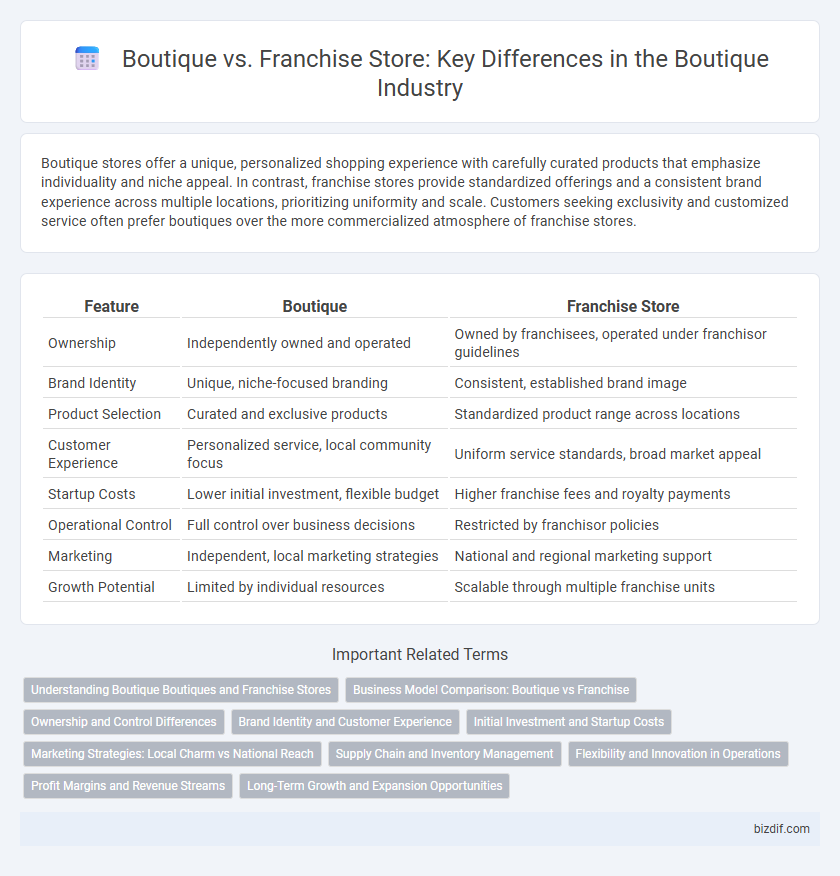Boutique stores offer a unique, personalized shopping experience with carefully curated products that emphasize individuality and niche appeal. In contrast, franchise stores provide standardized offerings and a consistent brand experience across multiple locations, prioritizing uniformity and scale. Customers seeking exclusivity and customized service often prefer boutiques over the more commercialized atmosphere of franchise stores.
Table of Comparison
| Feature | Boutique | Franchise Store |
|---|---|---|
| Ownership | Independently owned and operated | Owned by franchisees, operated under franchisor guidelines |
| Brand Identity | Unique, niche-focused branding | Consistent, established brand image |
| Product Selection | Curated and exclusive products | Standardized product range across locations |
| Customer Experience | Personalized service, local community focus | Uniform service standards, broad market appeal |
| Startup Costs | Lower initial investment, flexible budget | Higher franchise fees and royalty payments |
| Operational Control | Full control over business decisions | Restricted by franchisor policies |
| Marketing | Independent, local marketing strategies | National and regional marketing support |
| Growth Potential | Limited by individual resources | Scalable through multiple franchise units |
Understanding Boutique Boutiques and Franchise Stores
Boutique boutiques emphasize unique, personalized shopping experiences with curated, exclusive product selections tailored to niche markets, contrasting with franchise stores that prioritize standardized offerings and consistent branding across multiple locations. The boutique model allows for greater flexibility in merchandising and customer service, fostering strong local connections and brand identity. Franchise stores benefit from established brand recognition, larger marketing budgets, and operational support, often appealing to mass-market consumers seeking familiarity and reliability.
Business Model Comparison: Boutique vs Franchise
Boutiques operate on an independent business model focused on unique, curated product selections and personalized customer experiences, allowing for greater creative control and brand identity customization. Franchise stores follow a standardized business model with established brand guidelines, marketing strategies, and operational procedures to ensure consistency and scalability across multiple locations. The boutique model prioritizes niche market targeting and flexibility, while the franchise model emphasizes rapid expansion and uniform customer expectations.
Ownership and Control Differences
Boutiques are independently owned and operated, allowing entrepreneurs full control over brand identity, product selection, and customer experience, whereas franchise stores operate under a parent company's guidelines with standardized products and branding. Franchise owners pay ongoing fees and adhere to strict operational protocols, limiting their autonomy compared to boutique owners who can tailor their business strategies and inventory. This ownership and control distinction significantly impacts flexibility, creativity, and profit margins between boutique and franchise retail models.
Brand Identity and Customer Experience
Boutiques cultivate a unique brand identity through personalized design and limited product selection, creating an exclusive atmosphere that differentiates them from franchise stores. Franchise stores emphasize uniformity and brand consistency across locations, often resulting in a standardized customer experience. The tailored ambiance and bespoke service in boutiques foster stronger emotional connections and customer loyalty compared to the predictable interactions typical of franchises.
Initial Investment and Startup Costs
Boutique stores typically require a lower initial investment compared to franchise stores, as they avoid franchise fees and royalty payments. Startup costs for boutiques primarily include inventory, location rent, and personalized marketing, offering greater flexibility in budgeting. Franchise stores demand higher upfront costs due to franchise fees, standardized store design, and mandatory initial training, often exceeding $100,000 depending on the brand.
Marketing Strategies: Local Charm vs National Reach
Boutiques leverage localized marketing strategies by emphasizing unique, community-centric branding and personalized customer experiences to foster strong local loyalty. Franchise stores capitalize on national reach through standardized marketing campaigns, broad brand recognition, and consistent consumer messaging across multiple regions. The boutique's focus on niche markets contrasts with franchise stores' mass-market approach, making each strategy uniquely effective for its target audience.
Supply Chain and Inventory Management
Boutique stores maintain tighter control over supply chain processes, allowing for more agile inventory management and personalized product curation compared to franchise stores that rely on standardized, high-volume supply chains to ensure consistency across locations. Boutiques often source unique or limited-quantity items directly from local designers or manufacturers, reducing intermediaries and enabling faster restocking based on bespoke demand forecasting. Franchise stores prioritize streamlined logistics and bulk purchasing to optimize cost-efficiency, frequently utilizing centralized inventory systems that may limit flexibility and the ability to quickly adapt to regional consumer preferences.
Flexibility and Innovation in Operations
Boutiques excel in operational flexibility by swiftly adapting to local market trends and customizing product offerings, unlike franchise stores that adhere to standardized protocols across locations. The innovative nature of boutiques empowers owners to experiment with unique merchandising, personalized customer experiences, and niche marketing strategies that foster brand differentiation. This operational agility enables boutiques to respond promptly to consumer feedback and evolving fashion demands, setting them apart from the rigid frameworks of franchise models.
Profit Margins and Revenue Streams
Boutiques typically achieve higher profit margins than franchise stores due to lower operational costs and the ability to offer unique, high-end products that command premium prices. Revenue streams for boutiques often include exclusive designer collaborations and personalized services, which differentiate them from franchises that rely heavily on standardized products and volume sales. Franchises benefit from brand recognition and larger-scale marketing, but boutiques leverage niche appeal to maximize profitability per transaction.
Long-Term Growth and Expansion Opportunities
Boutiques offer unique branding and personalized customer experiences that foster strong local loyalty, driving sustainable long-term growth. Franchise stores benefit from established systems and broader market reach, enabling rapid expansion but often at the cost of individual brand identity. Long-term growth in boutiques depends on cultivating niche markets and maintaining exclusive product offerings, while franchises leverage replicable models and economies of scale for expansion.
Boutique Boutique vs Franchise Store Infographic

 bizdif.com
bizdif.com